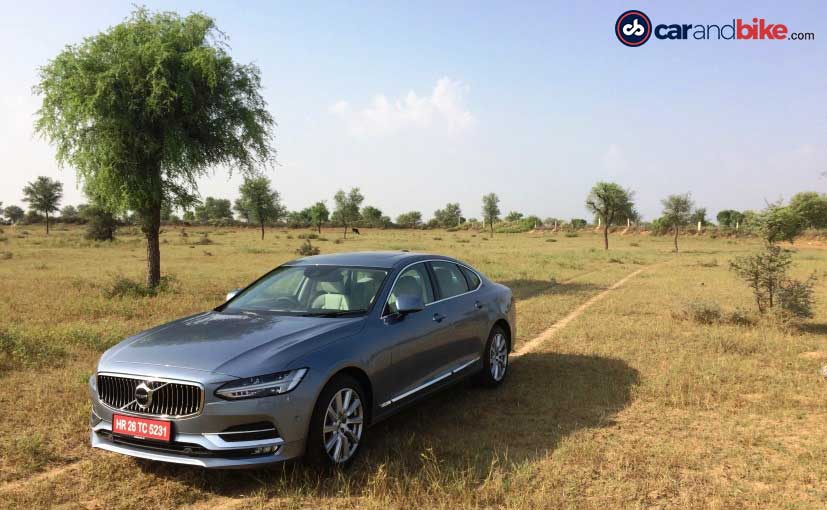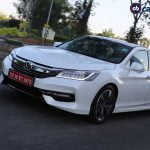Usually when we head out for drives, the flights are early and we have to head out just before sunrise and everything is a bit chaotic, though the city we leave is serene and, well, unaware of us. So, I expected something similar, when I headed to Jodhpur, to drive the Volvo S90. To my surprise, it was smooth sailing and I was left wondering, if I had done something wrong; but well I got into the flight, didn’t I?
As we landed in Jodhpur, the city was still waking up, while I headed to meet the car, which we had driven already, in Spain. As we checked in, my hands were itching to get behind the wheel of the S90, but formalities – like a product overview and lunch – were in order and I couldn’t slip out of those, right? So, as I counted the seconds, I had already shared a glance, with the new sedan, in the foyer, heading our way and was intrigued. I have been following the car’s development, ever since I first saw the car at the 2016 Geneva Motor Show.
2016 Volvo S90 Front Profile
Yes, it’s quite an intriguing sedan and it’ll finally make its way to India, in November, which means that Volvo is entering a segment, which has been, till date, ruled by the Germans. Now, the design of most of the cars, in this segment, underlines aggression – a bit ‘in-your-face’ kind of attitude, but we see none of that drama with the S90. The sedan takes its design cues from the XC90 SUV and we can see this with not just the straight shoulder line of the car, but also the ‘Thor’s Hammer’ LEDs that it gets. There are 23 concave rings on the front grille, which are beautiful and look as if they’ve been suspended in thin air.
The S90’s grille takes inspiration from the Volvo P1800
But there’s a history to that, as the inspiration is the Volvo P1800 and with the chrome on the S90, Volvo has taken it to another level altogether. The face then is calm and collected, which actually is a refreshing change, in this segment. There’s no aggression, so to say, on its face and yet it doesn’t look subdued. If you look closely, you actually might see a halo on top of its head. It’s the same face, you’ll probably make, when you’ve discovered inner peace and the S90 seems to be the guru on that front and the cabin reflects this too.
The Volvo S90’s cabin boasts of pristine materials and looks impeccable
It comes with Nappa leather upholstery, that too white and there are linear walnut décor inlays, which actually go well with the overall ambience. There’s a splash of leather all over – as the dashboard gets it, as do the steering wheel and the gear knob. Then there’s the Bower and Wilkins sound system, which comes with 19 speakers and a subwoofer and whose sound just takes your breath away. There’s Bluetooth connectivity, a CD player, in the centre, console storage, 2 USB ports and Aux-In as well. There are enough storage spaces inside too and, well, let me not forget the ventilated seats, which add to the opulence and the charm inside.
The S90 is available in a single ‘Inscription’ trim filled with features
But then, you might think, we journos get the cream of the lot to drive and all this will be available in the top-end model and the base variant will get nothing, right? Well, that’s where you’re wrong, there’ll be just one variant on offer, the Inscription and yes, you can pick and choose the colour of the car or the leather options on offer, but the feature list that I mentioned above remains unchanged and that’s where Volvo wants to differentiate itself from its rivals. So, you get the one variant, in the S90, and it’s filled to the brim with features, so there’s a 4-zone climate control system, a 12.3-inch widescreen digital instrument cluster and nine-inch portrait-oriented iPad-style display on the centre console.
You’re pampered at the rear too, as you get touch-sensitive climate controls, along with well-bolstered seats, but where I think it loses points is the sunroof, as it doesn’t extend beyond the front headrests. There are other features too – like Park Assist Pilot, Side Protection Impact System airbags, Hill Start Assist and many more. You also get Apple CarPlay, Navigation and even a Lane Keeping aid. But the touch screen is extremely intuitive and very responsive. It’s similar to operating a tablet, which is why the functions are familiar. What we missed though is an electronic steering adjustment because most of the S90’s rivals come equipped with it. But the knobs, the design, the nice looking chrome lining, which integrates into the dashboard, makes you wonder about the attention to detail given to each element; and this is when you stumble upon the barrel-tumblewheel-shaped ignition knob.
2016 Volvo S90 Performance
What India gets is the diesel D4 variant with a sub-2 litre engine. It’s 1969cc to be precise. The small 4 cylinder engine produces 190bhp and the 8-speed automatic gearbox makes sure all this power is seamlessly transferred to the wheels. There’s an initial lag in power delivery, but when it hits the 2000rpm mark, the 400Nm of torque comes into play and then it’s smooth and in some cases spirited sailing. It’s a well-insulated cabin and none of the engine noise punctures inside, in fact you have to remind yourself that it’s not petrol, but rather a diesel engine in there.
The new S90 replaces the Volvo S80 globally
Well, of course, we’ll compare it to the S80, which it replaces and we’ve seen how the diesel engine it came with had a bit of growl to it. You hear the engine growl only past 3700rpm and yet I’ll say the NVH levels are well contained. The S90 is at peace, as I said earlier, and hence don’t expect it to be sporty, although you can choose from the three driving modes – Comfort, Economy and Dynamic. In the Dynamic mode, the engine is rumbles a bit and the gear shifts at higher rpms and there’s a bit of drama, but you can clearly see that the S90 is not really able to sustain this image for long and wants to go back to being what it is – calm and collected.
The S90 will get the optional air suspension in India for improved ride quality
It’s also visible in the way this one rides. Underneath its sheet metal, the S90 employs Volvo’s SPA (Scalable Product Architecture) platform, which made its debut with the XC90. This means a transverse front-drive layout, with unequal-length control arms in the front suspension and a multilink layout in the rear. But the car coming to India will get the otherwise optional air suspension at the rear and it works its magic. The car just glides over everything and that’s when you keep your phone down and gaze out of the window and admire the colourful sky, at the same congratulating yourself on your buying decision.
The more powerful diesel with 235bhp of the S90 will be arriving next year in India
But, if you’re not one of those star/cloud gazers and want a powerful car, you’ll have to wait till next year, when the 235bhp D5 will make its way to India. When asked, if a petrol variant was in the offing, the folks at Volvo said that we’d rather bring in a plug-in hybrid than just a petrol and that makes a lot of sense, considering the response the company has got for the plug-in hybrid version of the XC90.
With over 250 pre-bookings, the S90 has already surpassed Volvo India’s expectations
The S90 will be launched in November and it definitely has what it takes to challenge its German rivals. The company is looking to extend its dealership network from 16 to probably 18 or 20, by the end of 2016, and this means more people will have access to the car. The S90 will come as a CBU to India, but expect the pricing to be extremely competitive and in the ₹ 55 lakh corridor.
[“source-ndtv”]





